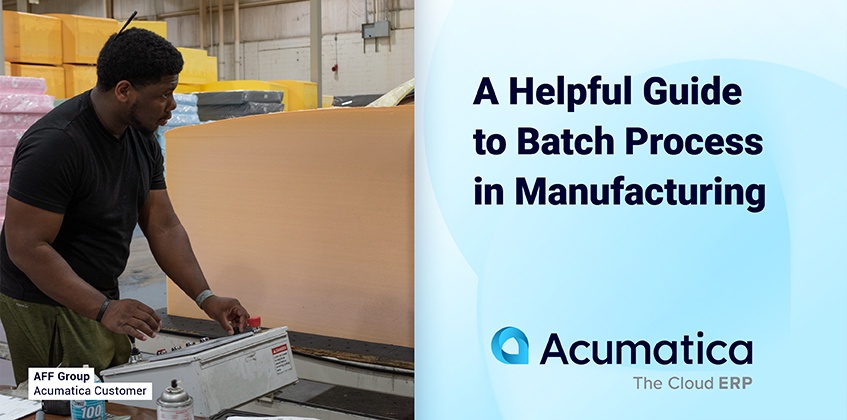
Batch process manufacturing software is a specialized Enterprise Resource Planning (ERP) solution designed for manufacturers who produce goods using recipes or formulas rather than bills of materials. Unlike discrete manufacturing, which assembles distinct parts, batch processing involves mixing, blending, or cooking ingredients in specific quantities to create products that cannot be easily disassembled, such as food, chemicals, and pharmaceuticals.
For mid-sized organizations, utilizing the right batch process manufacturing software is essential for maintaining regulatory compliance, managing complex units of measure, and ensuring lot traceability from cradle to grave.
Process vs. Discrete Manufacturing: What is the difference?
There are two fundamental categories of manufacturing ERP software—process and discrete. Both provide similar accounting, inventory management, purchasing, and order management features. However, they offer entirely distinct manufacturing functionalities.
Acumatica is one of the few ERP systems that support both process and discrete categories for mixed-mode manufacturing on a single platform, making it a powerful batch manufacturing ERP for multi-modal operations.
Understanding the distinction between process and discrete manufacturing is the first step in selecting the right software for your operations. While both require accounting, inventory, and order management, their production logic is entirely different.
Discrete Manufacturing
Discrete manufacturing includes furniture, automotive parts, fabricated metal products, industrial equipment and machinery, electronics, and other products that leverage a discrete, or defined bill of materials.
Generally speaking, discrete products are easier to disassemble into their base components. Manufacturing operations include assembly, cutting, bending, drilling, molding, and welding. Packaging and units of measure are commonly tracked by each item produced or by discrete dimensions, such as feet or pounds.
Process Manufacturing
Process Manufacturing includes chemicals, food, beverages, pharmaceuticals, and cosmetics with scalable formulas or recipes. These industries often benefit from using batch production software to ensure consistency and precision in every batch produced.
Unlike discrete products, it is often impossible to disassemble finished process goods back into their base components. Operations include mixing, blending, cooking, reducing, reacting, hydrating, dehydrating, infusing, and similar activities. These environments demand robust batch and process manufacturing ERP solutions to manage complex requirements effectively.
Process manufacturers also require specialized units of measure. For example, an orange juice manufacturer needs to see that they have 500,000 gallons of orange juice in stock. However, they need to know how many of those gallons are available in vats, barrels, cases, and bottles.
Process manufacturers also have specialized batch production requirements—for example, calculating formula concentrations or expected loss and yields based on environmental factors or raw material attributes.
Mixed-mode and Light Process Manufacturing
Many industries have lighter process manufacturing requirements or operate in a mixed-mode environment where they use both process and discrete production activities.
Mixed-mode and light process manufacturing are common in primary metals, non-metallic minerals, and rubber and plastics.
For example, an aluminum foundry needs to track the heat numbers and chemical composition of the products it makes. Similarly, there are various grades of mineral products and various formulas for manufacturing plastic and rubber products.
These companies traditionally use discrete manufacturing ERP applications, but they need flexibility for bill of material definitions with robust quality control and lot traceability.
Key Differences Between Batch Process and Discrete Manufacturing
| Discrete ERP | Process ERP | |
|---|---|---|
| Disassembly | It is easy to disassemble finished goods back into the original bill of material components. | It is difficult or impossible to disassemble finished goods into the original ingredients. |
| Structure | Bill of Material | Recipe or Formula |
| Materials | Solids | Liquid, Powder, or Gas |
| Operations | Cut, bend, drill, assemble, mold, bore, ream, weld, etc. | Blend, mix, react, cook, reduce, hydrate, dehydrate, infuse, etc. |
| Quality and Compliance | Limited lot and serial tracking. Minimal industry quality regulations such as ISO, 21 CFR Part 820, and more. | Significant quality and compliance including lot attributes, hazardous materials, safety data sheets, EPA and FDA regulations, and more. |
| UOM Packaging | Typically managed in limited discrete units of measure (each, pound, feet, etc.). Simple product packaging. | Managed in multiple units of measure with complex UOM conversions and intricate packaging rules. |
| Other Features | Engineering change orders, product configuration, estimating, installation, more. | Yield and loss, specific gravity, catch weights, concentrations, potency, expiration dates, more. |
Multi-Modal Manufacturing
Most process manufacturers are multi-modal. This means that they use multiple manufacturing strategies in production. For example, an orange juice manufacturer uses formulas or recipes to make the orange juice or concentrate, but filling containers with orange juice is a discrete manufacturing activity with known quantities for raw materials and finished goods.
Process manufacturers with standard products, like orange juice, usually operate in a make-to-stock way, where demand forecasts and customer orders drive production plans.
However, some process manufacturers operate in make-to-order environments. For example, a chemical manufacturer may make specialty batches based on customer specifications, such as chemical composition or ingredient concentration.
Other process manufacturers making high volume consumer products operate in repetitive manufacturing environments, where the same product is produced continuously on a dedicated production line.
In repetitive manufacturing, production is typically reported against the item being produced or the quantity produced by production line, as opposed to a predefined batch order or production order quantity.

Batch Process Manufacturing ERP Systems for SMBs
There are relatively few affordable Enterprise Resource Planning software options available for small and midsized businesses (SMBs) engaged in process manufacturing.
The few applications on the market are built on legacy technologies with minimal investment and shrinking installed bases. This forces many process manufacturers to adapt their production processes to fit the constraints of more popular discrete ERP systems.
Acumatica is one of the only modern, cloud-native ERP applications designed for small and mid-sized manufacturers that supports process manufacturing and mixed-mode production. In fact, hundreds of process manufacturers, like Devil’s Peak Beer, use Acumatica successfully. Its flexibility makes it ideal for companies seeking advanced batch manufacturing software with minimal customization.
Process manufacturers with advanced business requirements, such as scalable recipes or formulas and complex unit of measure conversions, leverage the Acumatica Process Manufacturing Suite by eWorkplace Apps (a sister company of Batchmaster, a pioneer in process manufacturing ERP applications).
This application suite is built on the Acumatica platform and fulfilled by Acumatica. It provides a seamless experience for users with connections to all parts of the application, including accounting, sales, purchasing, inventory management, and discrete manufacturing.
Acumatica’s combined discrete and process manufacturing features enable manufacturers to:
- Improve quality control, with product testing for raw material receipts, production, and virtually any inventory transaction.
- Define scalable recipes and formulas or bills of materials for process and discrete products.
- Customize products based on customer specifications and market needs.
- Evaluate inventory quantities with complex unit of measure conversions and flexible units of measure for stocking, purchasing, and sales.
- Manage perishable inventory with lot and serial traceability from raw materials to intermediates and finished goods with expiration dates.
- Manage production and costing for co-products and by-products.
Process manufacturing users appreciate Acumatica’s modern and affordable Process Manufacturing Suite. Jeff Hsu, eCommerce Supervisor for Sun Ten Laboratories, says:
“Sun Ten’s acquisition and implementation of Acumatica and eWorkplace Apps integrated process and quality management solution with its ability to control both powder and liquid formulas, handle multiple pack sizes, and control the production of our products, along with the ability to quarantine and test products, will provide us an ERP solution that helps ensure we meet our goals in the areas of safety, quality, efficacy, and consistency.”
Connected Quality Management
The eWorkplace Apps Quality Management Suite works with Acumatica’s distribution suite and discrete and process manufacturing applications. It supports:
- Quality Testing, Traceability, and Recall Notices.
- Checklists and Inspections.
- Certificates of Analysis (COA).
- Non-Conformance (NC) and Corrective and Preventive Action Plans (CAPA).
- Acceptable Quality Levels (AQL) and Sample Sizing.
- Traceability and Recall Notices.
Speaking about the Quality Management Suite, Justin Dickerson, ERP Analyst at Acumatica customer cbdMD, says: “We are able to upload all our COAs (certificates of analysis), our microbial tests, and quality tests, and if we’re audited and someone wants to know what happened in April, we’re able to pull a PDF. The quality department always tells me how much easier it is now.”
Conclusion
Acumatica is the best solution for process and mixed-mode manufacturers—providing a modern cloud business platform, robust financial applications, an extensive distribution suite, and solutions for discrete and process manufacturing with quality control.
Its robust features make it an exceptional choice for batch manufacturing ERP needs.
Frequently Asked Questions
Q: Can I use standard manufacturing software for batch processing?
A: Generally, no. Standard discrete software lacks the ability to handle formulas, complex unit-of-measure conversions (like liquid to solid), and yield/loss calculations required for batch processing.
Q: What is the difference between a recipe and a bill of materials?
A: A Bill of Materials (BOM) lists the distinct parts needed to assemble a product (e.g., screws, wood). A recipe or formula specifies the ingredients and processing steps (e.g., heat, stir duration) needed to create a mixture, often involving chemical reactions.
Q: How does software help with mixed-mode manufacturing?
A: Software like Acumatica allows you to run both process (mixing ingredients) and discrete (packaging bottles) workflows within the same system, ensuring data flows smoothly from the vat to the warehouse without manual data entry.
Q: How does batch process manufacturing support flexibility and product variant changes?
A: Batch processing allows manufacturers to adjust recipes or formulas easily, enabling quick shifts between product variants. This is especially valuable in industries like food and pharmaceuticals, where customization and small production runs are common.
Q: What are the key features to look for in batch process manufacturing software?
A: Manufacturers should look for features like scalable recipe management, lot traceability, quality control tools, compliance automation, and mixed-mode manufacturing capabilities to handle both batch and discrete processes.
Q: How does batch process manufacturing ensure traceability and quality control?
A: Batch processing tracks raw materials and finished goods through lot numbers, ensuring traceability from production to distribution. Integrated quality control tools help monitor and maintain product standards at every stage.
Q: What are the common challenges when transitioning to a batch process in manufacturing?
A: Challenges include managing changeovers, optimizing scheduling, handling inventory efficiently, and training staff to adapt to new workflows. Batch process software can help mitigate these issues by automating and streamlining operations.
Q: How can batch process manufacturing software optimize production efficiency?
A: Software solutions improve efficiency by automating recipe scaling, managing inventory to reduce waste, ensuring compliance, and integrating quality control processes. This minimizes downtime and enhances overall productivity.
 Canada (English)
Canada (English)
 Colombia
Colombia
 Caribbean and Puerto Rico
Caribbean and Puerto Rico
 Ecuador
Ecuador
 India
India
 Indonesia
Indonesia
 Ireland
Ireland
 Malaysia
Malaysia
 Mexico
Mexico
 Panama
Panama
 Peru
Peru
 Philippines
Philippines
 Singapore
Singapore
 South Africa
South Africa
 Sri Lanka
Sri Lanka
 Thailand
Thailand
 United Kingdom
United Kingdom
 United States
United States














